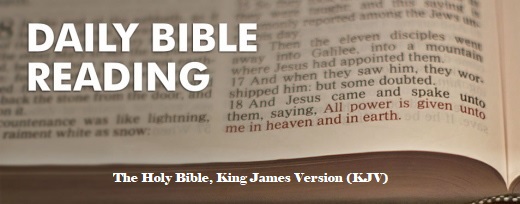Today’s Verse-of-the-Day:
Ye shall walk after the Lord your God, and fear him, and keep his commandments, and obey his voice, and ye shall serve him, and cleave unto him.The Israelites were called to be unique in the world, to represent the God of all creation among polytheistic nations. This placed them in tension with idolatrous religions. In this section of Scripture, Moses called the Israelites to stand firm in their faith and to abhor the enticing teachings of false prophets (V. 5).
Are there people in your life who pull you away from God? Ask God to help you influence their lives for Christ and keep them from negatively influencing your life and faith. Jesus said His sheep would recognize His voice and follow Him (John 10:27). Pray that you would hear Jesus’ voice and follow only Him.
Today’s Readings:
1 Praise ye the Lord. O give thanks unto the Lord; for he is good: for his mercy endureth for ever.Commentary
2 Who can utter the mighty acts of the Lord? who can shew forth all his praise?
3 Blessed are they that keep judgment, and he that doeth righteousness at all times.
4 Remember me, O Lord, with the favour that thou bearest unto thy people: O visit me with thy salvation;
5 That I may see the good of thy chosen, that I may rejoice in the gladness of thy nation, that I may glory with thine inheritance.
6 We have sinned with our fathers, we have committed iniquity, we have done wickedly.
19 They made a calf in Horeb, and worshipped the molten image.
20 Thus they changed their glory into the similitude of an ox that eateth grass.
21 They forgat God their saviour, which had done great things in Egypt;
22 Wondrous works in the land of Ham, and terrible things by the Red sea.
23 Therefore he said that he would destroy them, had not Moses his chosen stood before him in the breach, to turn away his wrath, lest he should destroy them.
None of our sins or sufferings should prevent our ascribing glory and praise to the Lord. The more unworthy we are, the more is his kindness to be admired. And those who depend on the Redeemer's righteousness will endeavor to copy his example, and by word and deed to show forth his praise. God's people have reason to be cheerful people and need not envy the children of men their pleasure or pride. Here begins a confession of sin; for we must acknowledge that the Lord has done right, and we have done wickedly. Often have we set up idols in our hearts, cleaved to some forbidden object; so that if a greater than Moses had not stood to turn away the anger of the Lord, we should have been destroyed.
24:9 Then went up Moses, and Aaron, Nadab, and Abihu, and seventy of the elders of Israel:Commentary
10 And they saw the God of Israel: and there was under his feet as it were a paved work of a sapphire stone, and as it were the body of heaven in his clearness.
11 And upon the nobles of the children of Israel he laid not his hand: also they saw God, and did eat and drink.
The elders saw the God of Israel; they had some glimpse of his glory, though whatever they saw, it was something of which no image or picture could be made, yet enough to satisfy them that God was with them of a truth. Nothing is described but what was under his feet. The sapphires are the pavement under his feet; let us put all the wealth of this world under our feet, and not in our hearts. Thus the believer sees in the face of Jesus Christ, far clearer discoveries of the glorious justice and holiness of God, than ever he saw under terrifying convictions; and through the Saviour, holds communion with a holy God.
4:4 Ye adulterers and adulteresses, know ye not that the friendship of the world is enmity with God? whosoever therefore will be a friend of the world is the enemy of God.Commentary
5 Do ye think that the scripture saith in vain, The spirit that dwelleth in us lusteth to envy?
6 But he giveth more grace. Wherefore he saith, God resisteth the proud, but giveth grace unto the humble.
7 Submit yourselves therefore to God. Resist the devil, and he will flee from you.
8 Draw nigh to God, and he will draw nigh to you. Cleanse your hands, ye sinners; and purify your hearts, ye double minded.
9 Be afflicted, and mourn, and weep: let your laughter be turned to mourning, and your joy to heaviness.
10 Humble yourselves in the sight of the Lord, and he shall lift you up.
Since all wars and fightings come from the corruptions of our own hearts, it is right to mortify those lusts that war in the members. Wordly and fleshly lusts are distempers, which will not allow content or satisfaction. Sinful desires and affections stop prayer and the working of our desires toward God. And let us beware that we do not abuse or misuse the mercies received, by the disposition of the heart when prayers are granted When men ask of God prosperity, they often ask with wrong aims and intentions. If we thus seek the things of this world, it is just in God to deny them. Unbelieving and cold desires beg denials; and we may be sure that when prayers are rather the language of lusts than of graces, they will return empty. Here is a decided warning to avoid all criminal friendships with this world. Worldly-mindedness is enmity to God. An enemy may be reconciled, but “enmity” never can be reconciled. A man may have a large portion in things of this life, and yet be kept in the love of God; but he who sets his heart upon the world, who will conform to it rather than lose its friendship, is an enemy to God. So that anyone who resolves at all events to be upon friendly terms with the world, must be the enemy of God. Did then the Jews, or the loose professors of Christianity, think the Scripture spake in vain against this worldly-mindedness? or does the Holy Spirit who dwells in all Christians, or the new nature which he creates, produce such fruit? Natural corruption shows itself by envying. The spirit of the world teaches us to lay up, or layout for ourselves, according to our own fancies; God the Holy Spirit teaches us to be willing to do good to all about us, as we are able. The grace of God will correct and cure the spirit by nature in us; and where he gives grace, he gives another spirit than that of the world. The proud resist God: in their understanding, they resist the truths of God; in their will, they resist the laws of God; in their passions, they resist the providence of God; therefore, no wonder that God resists the proud. How wretched the state of those who make God their enemy! God will give more grace to the humble, because they see their need of it, pray for it are thankful for it, and such shall have it. Submit to God, (v. 7). Submit your understanding to the truth of God; submit your wills to the will of his precept, the will of his providence. Submit yourselves to God, for he is ready to do you good. If we yield to temptations, the devil will continually follow us; but if we put on the whole armor of God, and stand out against him, he will leave us. Let sinners then submit to God, and seek his grace and favor; resisting the devil. All sin must be wept over; here, in godly sorrow, or, hereafter, in eternal misery. And the Lord will not refuse to comfort one who really mourns for sin or to exalt one who humbles himself before him.
Optional parts of the readings are set off in [square brackets.]
The Bible texts of the Old Testament, Epistle, and Gospel lessons are from The Holy Bible, King James Version (KJV).
Commentaries from Matthew Henry's Concise Commentary on the Bible.
The Daily Bible Readings are selected from the Revised Common Lectionary Daily Readings, a three-year cyclical lectionary. We are currently in Year A. Beginning with the first Sunday of Advent in 2020, we will be in Year B. The year which ended at Advent 2019 was Year C. These readings complement the Sunday and festival readings: Thursday through Saturday readings help prepare the reader for the Sunday ahead; Monday through Wednesday readings help the reader reflect and digest what they heard in worship. Revised Common Lectionary Daily Readings, copyright © 2005 Consultation on Common Texts. www.commontexts.org
The Daily Readings for FRIDAY, October 9, 2020
Psalm 106:1-6, 19-23; Exodus 24:9-11; James 4:4-10 (KJV)










